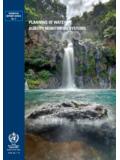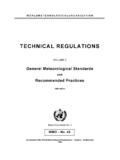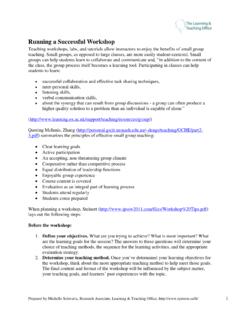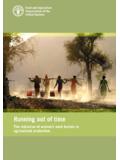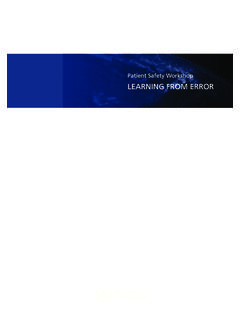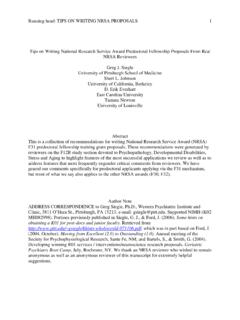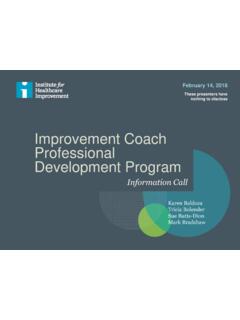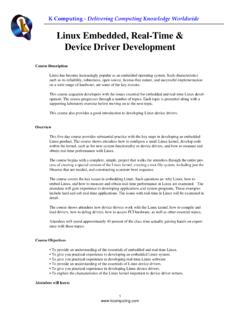Transcription of Report of the Capacity Building Training Workshop on ...
1 Report OF THE Capacity Building Training Workshop ON REDUCING THE IMPACTS OF CLIMATE EXTREMES ON HEALTH (Nairobi, Kenya, 11 15 February 2002) WCASP - No. 59 WMO-TD No. 1162 WORLD METEOROLOGICAL ORGANIZATION February 2002 2 TABLE OF CONTENTS 1. Workshop Workshop Workshop Official Opening of the 2 Introductory presentations and country Workshop WMO programmes on climate and Global climate change and ENSO: Implications on Linking climate and human Country 3 Technical Session on ENSO Remote sensing in Potential use of GIS techniques in the health Impacts of various ENSO phases in the GHA Kenya Country Case Study: Once Burnt, Twice Shy? Lessons learned from the 1997/98 El Ni 4 Applying climate forecasts in the health 5 Technical Session on climate diagnosis, prediction and 12 Lessons learned from the field excursion to 6 Recommendations and Way Lack of Lack of awareness on the part of the Lack of political will and Lack of Early Warning Systems (EWSs).
2 14 Follow-up ANNEX ANNEX ANNEX 3 1. INTRODUCTION Workshop objectives The overall objective of the Workshop was to build the Capacity of the health professionals and climate scientists in the nations of the Greater Horn of Africa (GHA) sub-region on practical applications of climate information and prediction services in the health sector for improved decision-making and better management of health services. The objective was achieved through lectures, practical demonstrations, laboratory exercises, plenary discussions, and field excursions. In addition, the World Meteorological Organization (WMO) provided the participants with material in form of brochures, Compact Discs (CDs) and other publications containing detailed information on linkages between weather, climate and health.
3 Workshop participation/organization The Workshop attracted participants from all countries who are members of the Drought Monitoring Centre, Nairobi (DMCN), Burundi, Djibouti, Ethiopia, Kenya, Tanzania, Eritrea, Sudan, Rwanda, Somalia, and Uganda. It was initially anticipated that only twenty participants would attend the Workshop , namely one participant each from the health and climate sectors from each of the ten countries. However, close to 50 participants came to the Workshop reflecting the interest in the relationship between climate and health. The complete list of registered participants is given in Annex II. The Workshop was funded by WMO, and was hosted by DMCN in collaboration with the Kenya Medical Research Institute (KEMRI), the Ministry of Health of Kenya (MoH), Moi University, and the University of Nairobi (UoN).
4 Workshop programme The programme for the Workshop is given in Annex I. The major issues addressed within the five sessions of the programme included: Session I: Introductory presentations and country experiences This session, which is described in more detail in Section 2, dealt with: Workshop perspectives; WMO Programmes on climate and health; Global climate change and El Ni o Southern Oscillation (ENSO): Implications on Africa; and Linking climate and human health: Country presentations. Session II: Technical Session on ENSO impacts Session II is summarised in Section 3. The topics discussed are: Use of remote sensing in epidemiology; Potential use of Global Information System (GIS) techniques in the health sector; Impacts of various ENSO phases in the GHA sub-region; Presentation of the lessons learned by Kenya from the recent United Nations Country Case study on the impacts of 1997/98 El Ni o - "Once Burnt, Twice Shy"; Applications of climate forecasts in the health sector.
5 Session III: Applying climate forecasts in the health sector In Section 4, a brief summary of Session III can be found. The session was concerned with the following: Impacts of climate on acute respiratory infections; Epidemics and climate change; Environmental health management options during extreme climatic events; Predictability of the climate of eastern Africa sub-region; Climates of GHA and health risk mapping with climate indicators; Predicting malaria upsurges in the Kenyan highlands; and Exercises on basic statistical concepts used in climate information and prediction services. Session IV: Technical Session on climate diagnosis, prediction and verification This session included an introduction to climate diagnosis, prediction and verification, group work to refine the framework and follow-up Plans of Action, and an excursion to the Kenya Medical Research Institute (KEMRI).
6 Details of the session are given in Section 5. Session V: Way forward Major highlights of Session V are presented in Section 6 of this Report . The session dealt with: Integration of climate and health in Health Training Programmes; Ways to implement health planning based on knowledge of climate; Capacity Building , Problems, gaps and strategies, and Future interactions. Official Opening of the Workshop The director of KMD, Dr Joseph R Mukabana, formally opened the Workshop . In his remarks, he observed that a number of diseases are significantly influenced by climate conditions and that water-borne diseases like cholera are generally sensitive to changes in the water cycle. High temperatures enhance the survival of bacteria, viruses and protozoa, and a combination of wet and warm conditions is conducive to the transmission of malaria and Denge fever, among other diseases.
7 The extensive malaria epidemic observed in the GHA in 1997/98 was a good illustration of the association between climate variations and disease outbreaks. 1997/98 also saw the return of some diseases that had not been observed in the region for many decades, rift valley fever. More often than not a time lag is observed between the occurrence of a specific climate event and the disease outbreak. Timely availability of accurate climate information can therefore provide crucial information regarding the likely occurrence of certain diseases. He advised the Workshop to come up with sound recommendations that could enable the health and climate sectors in the GHA develop sound policies for factoring climate information in the planning and development of health delivery services in the GHA sub-region.
8 Mr Paul Llans , Chief of the World Climate Applications Division (WCD) of the World Climate Programme (WCP) of WMO, and Professor Laban A. Ogallo, the co-ordinator of DMCN, also addressed the opening session. Mr Llans thanked the directors of KMD and DMCN for hosting the Workshop . He noted that Prof Ogallo had been asking for WMO assistance in conducting this Workshop for nearly a year, and he thanked Prof Ogallo for significant help in determining the location, the participants, and the resources for the Workshop . He 5remarked on the considerable efforts of all the staff in arranging the travel of the participants and the provision of excellent facilities. Over the last decade, the scientific community has learned much about climate change and its expected impacts on many sectors.
9 The Third Assessment Report of the Intergovernmental Panel on Climate Change (IPCC) (IPCC, 2001) can be regarded as the most authoritative resource on the subject. A partnership has been established between the World Health Organization (WHO), the United Nations Environment Programme (UNEP) and WMO in addressing climate and health issues in the past decade. In 1999, 185 countries around the globe celebrated the World Meteorological Day themed Weather, Climate and Health that year. The partner agencies also collaborated to support the pilot Showcase Projects that implemented Heat/Health Warning Systems in Rome and Shanghai. Perhaps the best-known work to come from the partnership is the book Climate Change and Human Health by McMichael et al.
10 (1996). During the last four years, the agencies had agreed on expanding work to focus on Capacity Building activities, information exchange, and research promotion, all focused on the benefits of national and local health uses of climatic and environmental information. The objective of this Workshop was to address all the focus areas and to expand upon the lessons learned in a similar Workshop held in Niamey, Niger, in 2001. The Workshop can be regarded as a significant event in the establishment of the WMO Commission for Climatology's expansion beyond its primary focus on heat-related health issues, to include climate-related infectious diseases. He noted that the needs in applying research results in operation are great, there are potentially significant gains for populations, and there is increasing willingness among governments and donors to consider and support this.


